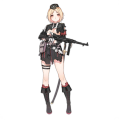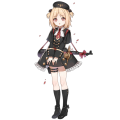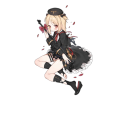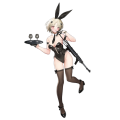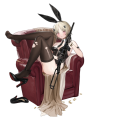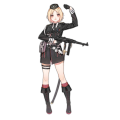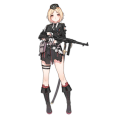Ranking of this Doll's specs relative to other Dolls of the same type.
MP40: Difference between revisions
No edit summary |
m Adding the name for MP40's costume2 |
||
| (33 intermediate revisions by 17 users not shown) | |||
| Line 1: | Line 1: | ||
{{PlayableUnit | |||
|index = 25 | |||
|nationality = Nazi Germany | |||
|classification = SMG | |||
|rarity = 2 | |||
|faction = [[Griffin & Kryuger]] | |||
|manufactureringame = [[I.O.P.]] | |||
|manufacturer = Steyr Mannlicher, Erma Werke | |||
|artist = {{artist name|废人}} | |||
|fullname = Maschinenpistole 40 | |||
|voiceactor = {{voice actor name|Matsui Eriko}} | |||
|releasedon = {{doll_server_alias|server=CN|alias=MP40|year=2016|month=5}}, {{doll_server_alias|server=TW|alias=MP40}}, {{doll_server_alias|server=KR|alias=MP40}}, {{doll_server_alias|server=EN|alias=MP40}}, {{doll_server_alias|server=JP|alias=MP40}} | |||
|weaponinfo = | |||
The MP 40 (Maschinenpistole 40) was a 9x19mm Parabellum submachine gun developed in Nazi Germany. Designed in 1938 by Heinrich Vollmer with inspiration from its predecessor the MP 38, the MP 40 would be used extensively by the Axis powers during World War II, being wielded by infantrymen, paratroopers, and platoon/squad leaders on both the Eastern and Western fronts. Its advanced design and modern features made it a favorite among soldiers and it would remain popular in various countries around the world long after the war.<ref name = "MP40 Wiki">[https://en.wikipedia.org/wiki/MP_40 Wikipedia entry on the MP 40]</ref> | |||
The MP 40 was derived from its predecessor the MP 38, which was in turn based on the MP 36, a prototype design made of machined steel. The MP 36 was developed independently by Erma Werke's Berthold Geipel, backed by funding from the German Army. It took design elements from Heinrich Vollmer's earlier VPM 1930 and EMP designs. Vollmer himself then worked on Geipel's MP 36, and in 1938 submitted a finished prototype to the Heereswaffenamt (Army Weapons Office) for testing. The weapon would pass testing, and would be adopted as the MP 38. The MP 38 was a simplification of the MP 36, and the MP 40 was a further simplification of the MP 38, with certain cost-saving alterations, most notably in the more extensive use of stamped steel components rather than machined parts. | |||
The MP40 submachine gun is an open-bolt, blowback-operated automatic submachine gun. It is fully automatic only, but the relatively low rate of fire enabled easy single shots with controlled trigger pulls. The MP38 receiver was made of machined steel, but this was a time-consuming and expensive process. To save time and materials, and thus increase production, construction of the MP 40 receiver was simplified by using stamped steel and electro-spot welding as much as possible. The MP38 also features longitudinal grooving on the receiver and bolt, as well as a circular opening on the magazine housing. These features were eliminated on the MP40, also in the name of easing manufacturing. The MP 40 is notable for being the first submachine gun to feature a forward-folding metal stock, which helped the gun be compact when stowed away.<ref name = "MP38/40 Forgotten Weapons">[https://www.youtube.com/watch?v=cdQhO8FtY7c Forgotten Weapons video on the MP 38 and the MP 40]</ref> | |||
Although the MP 40 was generally reliable, a major weakness was its 32-round magazine. Unlike the double-column, dual-feed magazine insert found on the Thompson M1921/1928 submachine guns, the MP 40 used a double-column, single-feed insert. The single-feed insert resulted in increased friction against the remaining cartridges moving upwards towards the feed lips, occasionally resulting in feed failures; this problem was exacerbated by the presence of dirt or other debris. Other issues with the MP 40 design included the barrel lacking any form of insulation, which often resulted in burns on the supporting hand if it was incorrectly positioned. | |||
At the outbreak of World War II, the majority of German soldiers carried either Karabiner 98k rifles or MP 40s, both of which were regarded as the standard weapons of choice for an infantryman. However, in later confrontations with Soviet troops such as the Battle of Stalingrad, where entire enemy units were armed with PPSh-41 submachine guns, the Germans found themselves out-gunned in short range urban combat. This caused a shift in German tactics, and by the end of the war the MP 40 and its derivatives were being issued to entire assault platoons on a limited basis. Starting in 1943, the German military moved to replace both the Karabiner 98k rifle and MP 40 with the StG-44. By the end of World War II in 1945, an estimated 1.1 million MP 40s had been produced. Following the end of World War 2, upwards of 200,000 MP 40s were captured or surrendered to the Allies, and were then redistributed to the paramilitary and irregular forces of some developing countries. | |||
|design = | |||
With attire that calls to mind a member of the German Schutzstaffel, MP 40's appearance is both professional and a little intimidating. Much of her attire is comparable to some of the other German WWII-era T-Dolls, such as {{doll name|FG42|MG|2}}, {{doll name|MG42|MG|3}}, {{doll name|C96|HG|3}}, and {{doll name|StG44|AR|3}}. The uniform has had its Nazi symbolism removed, replaced with more contemporary German regalia such as the Iron Cross from WWI. She also carries a saber, but does not actually employ it during combat. Her design gives her a distinctive battlefield presence; whereas many T-Dolls favor more civilian-oriented attire, MP40 cheerfully wears her old-school gear, largely ''because'' of the vibe it gives off. | |||
Her 'Thumbelina' costume is a cutesy version of her normal attire, replacing the fancy dress uniform with an old dress favored in pre-war era Germany. It also festoons her weapon with pretty ribbons, fitting as the costume is basically MP40 turned into a little girl. | |||
|min_dmg=11 | |||
|max_dmg=29 | |||
|min_eva=8 | |||
|max_eva=58 | |||
|min_acc=2 | |||
|max_acc=13 | |||
|min_rof=52 | |||
|max_rof=76 | |||
|min_hp=92 | |||
|max_hp=185 | |||
|mov=12 | |||
|noheavycraft=1 | |||
|craft=1:30:00 | |||
|drop=Can be obtained from many battle stages from Chapter 1-4 onward. | |||
|reward=Achievement Reward for doing Construction for the first time. | |||
|aura1= Affects assault rifles | |||
|aura2= Increases accuracy by 25% | |||
|aura3= Increases evasion by 20% | |||
|tile1= 1 | |||
|tile7=1 | |||
|tile5=0 | |||
|costume1 = Thumbelina | |||
|costume2 = Champagne of Spades | |||
|gallery=<gallery> | |||
File:MP40_S.png|Profile image | |||
File:MP40.png|Full artwork | |||
File:MP40_D.png|Full damaged artwork | |||
File:MP40_costume1_S.png|"Thumbelina" profile image | |||
File:MP40_costume1.png|"Thumbelina" artwork | |||
File:MP40_costume1_D.png|"Thumbelina" damaged artwork | |||
File:MP40_costume2.png|"Champagne of Spades" Full artwork | |||
File:MP40_costume2_D.png|"Champagne of Spades" Full damaged artwork | |||
</gallery> | |||
|galleryAlt=<gallery> | |||
File:MP40 (Censored).png|Full artwork (Censored) | |||
File:MP40_D (Censored).png|Full damaged artwork (Censored) | |||
File:GFL Beta Wallpaper.jpg|Prerelease artwork. | |||
File:Beguiling Chip Login Wallpaper.jpg|Beguiling Chip Login Wallpaper. | |||
</gallery> | |||
|trivia = | |||
*An experimental version of the MP40 called the MP40/I had a dual-magazine housing, allowing operators to switch to another magazine by pressing the latch at the front of magazine housing and sliding the second mag into place. The MP40/I never entered service, though it did undergo field trials. The MP40/I weighed around 12 pounds (compared to the roughly 8-pound weight of the standard MP40), was front-heavy, and was vulnerable to jamming, which led to the project's cancellation.<ref name = "experimental mp40 forgotten weapons>[https://www.forgottenweapons.com/submachine-guns/mp40i-dual-mag/ Forgotten Weapons website entry on the MP40/I]</ref> | |||
*Her name was MP38 in official art before it was changed to MP40.<ref name = "og mp40">[https://pbs.twimg.com/media/CHLdLtOUgAAkzIs.png:orig Early official art of MP40]</ref> | |||
*MP40's uniform appears to be based on the uniforms worn by German tank crews during WW2. This would fit the weapon's role as a personal defense weapon for tank crews, as well as the black coloration of her uniform helping to prevent oil stains from showing on the fabric. The saber that she carries is likely also a reference to the fact that submachine guns were often carried by commanding officers of infantry platoons at the time. Her shoulder-straps and patches identify her as an SS Obersturmführer, a rank equivalent to a lieutenant. | |||
*Although the MP40 was designed by Heinrich Vollmer, it is often called the "Schmeisser" by Allied sources. Hugo Schmeisser had no part in the development of the MP40, but his name was associated with the weapon due to his involvement with earlier designs, such as the MP18. | |||
}} | |||
[[Category:T-Dolls with censoring]] | |||
Latest revision as of 03:41, 18 September 2024
| MP40 | Story | Quotes |
MP40 25 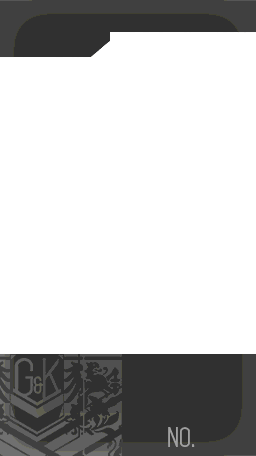 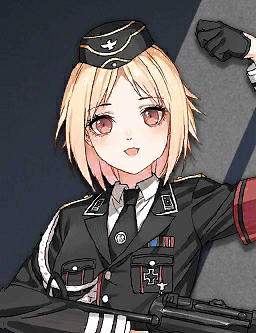 | |
| Gun Information | |
|---|---|
| Full name | Maschinenpistole 40 |
| Country of origin | Nazi Germany |
| Manufacturer | Steyr Mannlicher, Erma Werke |
| Game Information | |
| Faction | Griffin & Kryuger |
| Manufactured / Revised by |
I.O.P. |
| Voice actor | Matsui Eriko |
| Artist | 废人 |
| Released on | CN (2016-5), TW, KR, EN, JP |
| Chibi Animation | |
| Variant:
Click the marked area to switch between animations. For details regarding animations, please see Animations on the Wiki. | |
| View page template | |
How to obtain[edit]
NORMALHEAVY Timer 1:30:00. See T-Doll Production for details.
DROP Can be obtained from many battle stages from Chapter 1-4 onward.
REWARD Achievement Reward for doing Construction for the first time.
Exclusive Equipment[edit]
There is no exclusive equipment for this T-Doll.
Union Skill[edit]
There is no union skill for this T-Doll.
Stats / Data[edit]
| 92(x1) → 185(x1) / 925(x5) | 25(x1) / 85(x5) | 20(x1) / 60(x5) |
|
| ||||||||
|
| ||||||||
| 12 | 0 | ||||||||
| 5% | 50% | ||||||||
| 15 |
Ranking of this Doll's specs relative to every other Doll.
Weapon Background[edit]
The MP 40 (Maschinenpistole 40) was a 9x19mm Parabellum submachine gun developed in Nazi Germany. Designed in 1938 by Heinrich Vollmer with inspiration from its predecessor the MP 38, the MP 40 would be used extensively by the Axis powers during World War II, being wielded by infantrymen, paratroopers, and platoon/squad leaders on both the Eastern and Western fronts. Its advanced design and modern features made it a favorite among soldiers and it would remain popular in various countries around the world long after the war.[1]
The MP 40 was derived from its predecessor the MP 38, which was in turn based on the MP 36, a prototype design made of machined steel. The MP 36 was developed independently by Erma Werke's Berthold Geipel, backed by funding from the German Army. It took design elements from Heinrich Vollmer's earlier VPM 1930 and EMP designs. Vollmer himself then worked on Geipel's MP 36, and in 1938 submitted a finished prototype to the Heereswaffenamt (Army Weapons Office) for testing. The weapon would pass testing, and would be adopted as the MP 38. The MP 38 was a simplification of the MP 36, and the MP 40 was a further simplification of the MP 38, with certain cost-saving alterations, most notably in the more extensive use of stamped steel components rather than machined parts.
The MP40 submachine gun is an open-bolt, blowback-operated automatic submachine gun. It is fully automatic only, but the relatively low rate of fire enabled easy single shots with controlled trigger pulls. The MP38 receiver was made of machined steel, but this was a time-consuming and expensive process. To save time and materials, and thus increase production, construction of the MP 40 receiver was simplified by using stamped steel and electro-spot welding as much as possible. The MP38 also features longitudinal grooving on the receiver and bolt, as well as a circular opening on the magazine housing. These features were eliminated on the MP40, also in the name of easing manufacturing. The MP 40 is notable for being the first submachine gun to feature a forward-folding metal stock, which helped the gun be compact when stowed away.[2]
Although the MP 40 was generally reliable, a major weakness was its 32-round magazine. Unlike the double-column, dual-feed magazine insert found on the Thompson M1921/1928 submachine guns, the MP 40 used a double-column, single-feed insert. The single-feed insert resulted in increased friction against the remaining cartridges moving upwards towards the feed lips, occasionally resulting in feed failures; this problem was exacerbated by the presence of dirt or other debris. Other issues with the MP 40 design included the barrel lacking any form of insulation, which often resulted in burns on the supporting hand if it was incorrectly positioned.
At the outbreak of World War II, the majority of German soldiers carried either Karabiner 98k rifles or MP 40s, both of which were regarded as the standard weapons of choice for an infantryman. However, in later confrontations with Soviet troops such as the Battle of Stalingrad, where entire enemy units were armed with PPSh-41 submachine guns, the Germans found themselves out-gunned in short range urban combat. This caused a shift in German tactics, and by the end of the war the MP 40 and its derivatives were being issued to entire assault platoons on a limited basis. Starting in 1943, the German military moved to replace both the Karabiner 98k rifle and MP 40 with the StG-44. By the end of World War II in 1945, an estimated 1.1 million MP 40s had been produced. Following the end of World War 2, upwards of 200,000 MP 40s were captured or surrendered to the Allies, and were then redistributed to the paramilitary and irregular forces of some developing countries.
Character Design
With attire that calls to mind a member of the German Schutzstaffel, MP 40's appearance is both professional and a little intimidating. Much of her attire is comparable to some of the other German WWII-era T-Dolls, such as MG FG42FG42FG42, MG MG42MG42MG42, HG C96C96C96, and AR StG44StG44StG44. The uniform has had its Nazi symbolism removed, replaced with more contemporary German regalia such as the Iron Cross from WWI. She also carries a saber, but does not actually employ it during combat. Her design gives her a distinctive battlefield presence; whereas many T-Dolls favor more civilian-oriented attire, MP40 cheerfully wears her old-school gear, largely because of the vibe it gives off.
Her 'Thumbelina' costume is a cutesy version of her normal attire, replacing the fancy dress uniform with an old dress favored in pre-war era Germany. It also festoons her weapon with pretty ribbons, fitting as the costume is basically MP40 turned into a little girl.
Gallery
Main artwork
Gallery consisting of artworks used primarily in-game. For information on how to obtain certain costumes, see Skin Catalogue.
-
Profile image
-
Full artwork
-
Full damaged artwork
-
"Thumbelina" profile image
-
"Thumbelina" artwork
-
"Thumbelina" damaged artwork
-
"Champagne of Spades" Full artwork
-
"Champagne of Spades" Full damaged artwork
Alternative artwork
Alternate gallery consisting of artworks with slight alterations as well as miscellaneous artworks.
-
Full artwork (Censored)
-
Full damaged artwork (Censored)
-
Prerelease artwork.
-
Beguiling Chip Login Wallpaper.
Trivia
- An experimental version of the MP40 called the MP40/I had a dual-magazine housing, allowing operators to switch to another magazine by pressing the latch at the front of magazine housing and sliding the second mag into place. The MP40/I never entered service, though it did undergo field trials. The MP40/I weighed around 12 pounds (compared to the roughly 8-pound weight of the standard MP40), was front-heavy, and was vulnerable to jamming, which led to the project's cancellation.[3]
- Her name was MP38 in official art before it was changed to MP40.[4]
- MP40's uniform appears to be based on the uniforms worn by German tank crews during WW2. This would fit the weapon's role as a personal defense weapon for tank crews, as well as the black coloration of her uniform helping to prevent oil stains from showing on the fabric. The saber that she carries is likely also a reference to the fact that submachine guns were often carried by commanding officers of infantry platoons at the time. Her shoulder-straps and patches identify her as an SS Obersturmführer, a rank equivalent to a lieutenant.
- Although the MP40 was designed by Heinrich Vollmer, it is often called the "Schmeisser" by Allied sources. Hugo Schmeisser had no part in the development of the MP40, but his name was associated with the weapon due to his involvement with earlier designs, such as the MP18.
References[edit]
| List of T-Dolls |
|---|
















